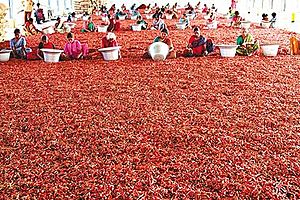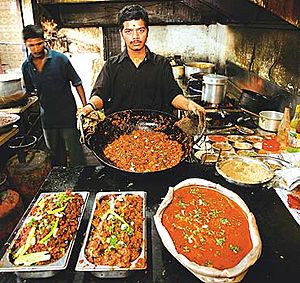Guntur chilli facts for kids
Quick facts for kids Guntur chilli |
|
|---|---|

Guntur chillies drying in the sun in Andhra Pradesh, India
|
|
| Species | Capsicum chinense |
| Heat | |
| Scoville scale | 30,000–350,000 SHU |
Guntur chillies are a special type of chilli grown in the Guntur and Prakasam areas of Andhra Pradesh, India. These chillies are famous all over the world. They are even sent to countries in Asia, Canada, and Europe!
The Guntur district is a major hub for growing and selling many kinds of chillies. It also exports a lot of chilli powder from India. These spicy chillies are sent to places like Sri Lanka, Bangladesh, the Middle East, South Korea, the UK, the US, and Latin America. Chillies come in different colors and flavors. This is because of a natural chemical called capsaicin inside them, which makes them hot!
Guntur chillies are a very important part of many tasty dishes and curries in Andhra Pradesh. The biggest market for Guntur chillies is called the Guntur Mirchi Yard. It is Asia's largest market for dried red chillies. You can find out the prices for these chillies on the National Agriculture Market website.
Types of Guntur Chillies

There are several popular types of Guntur chillies. Each one has its own special qualities:
- 334 chilli is a top-quality chilli that is often exported to other countries.
- Teja chilli is another excellent type of Guntur chilli.
- Guntur Sannam – S4 Type is one of the most famous Guntur chillies. It is in high demand around the world. This chilli grows widely in the Guntur, Prakasam, Warangal, and Khammam districts of Andhra Pradesh. When crushed, its skin is thick, red, and very hot. The best time to harvest this chilli is from December to May. About 280,000 tonnes of this chilli are produced each year. Its heat level is about 35–45 SHU (Scoville Heat Units), which tells you how spicy it is.
- 273 chilli is a common type of Guntur chilli that looks a bit wrinkled.
Other kinds of Guntur chillies include Phatki, Indo-5, Ankur, Roshni, Bedki, and Madhubala.
 | John T. Biggers |
 | Thomas Blackshear |
 | Mark Bradford |
 | Beverly Buchanan |

